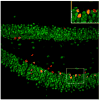Neurogenesis, inflammation and behavior
- PMID: 22985767
- PMCID: PMC3518576
- DOI: 10.1016/j.bbi.2012.09.003
Neurogenesis, inflammation and behavior
Abstract
Before the 1990s it was widely believed that the adult brain was incapable of regenerating neurons. However, it is now established that new neurons are continuously produced in the dentate gyrus of the hippocampus and olfactory bulb throughout life. The functional significance of adult neurogenesis is still unclear, but it is widely believed that the new neurons contribute to learning and memory and/or maintenance of brain regions by replacing dead or dying cells. Many different factors are known to regulate adult neurogenesis including immune responses and signaling molecules released by immune cells in the brain. While immune activation (i.e., enlargement of microglia, release of cytokines) within the brain is commonly viewed as a harmful event, the impact of immune activation on neural function is highly dependent on the form of the immune response as microglia and other immune-reactive cells in the brain can support or disrupt neural processes depending on the phenotype and behavior of the cells. For instance, microglia that express an inflammatory phenotype generally reduce cell proliferation, survival and function of new neurons whereas microglia displaying an alternative protective phenotype support adult neurogenesis. The present review summarizes current understanding of the role of new neurons in cognition and behavior, with an emphasis on the immune system's ability to influence adult hippocampal neurogenesis during both an inflammatory episode and in the healthy uninjured brain. It has been proposed that some of the cognitive deficits associated with inflammation may in part be related to inflammation-induced reductions in adult hippocampal neurogenesis. Elucidating how the immune system contributes to the regulation of adult neurogenesis will help in predicting the impact of immune activation on neural plasticity and potentially facilitate the discovery of treatments to preserve neurogenesis in conditions characterized by chronic inflammation.
Copyright © 2012 Elsevier Inc. All rights reserved.
Conflict of interest statement
Figures

References
-
- Ajami B, Bennett JL, Krieger C, Tetzlaff W, Rossi FM. Local self-renewal can sustain CNS microglia maintenance and function throughout adult life. Nat Neurosci. 2007;10:1538–43. - PubMed
-
- Alliot F, Godin I, Pessac B. Microglia derive from progenitors, originating from the yolk sac, and which proliferate in the brain. Brain Res Dev Brain Res. 1999;117:145–52. - PubMed
-
- Ambrogini P, Orsini L, Mancini C, Ferri P, Ciaroni S, Cuppini R. Learning may reduce neurogenesis in adult rat dentate gyrus. Neurosci Lett. 2004;359:13–6. - PubMed
-
- Amrein I, Isler K, Lipp HP. Comparing adult hippocampal neurogenesis in mammalian species and orders: influence of chronological age and life history stage. Eur J Neurosci. 2011;34:978–87. - PubMed
-
- Anderson MF, Aberg MA, Nilsson M, Eriksson PS. Insulin-like growth factor-I and neurogenesis in the adult mammalian brain. Brain Res Dev Brain Res. 2002;134:115–22. - PubMed
Publication types
MeSH terms
Substances
Grants and funding
LinkOut - more resources
Full Text Sources
Other Literature Sources

